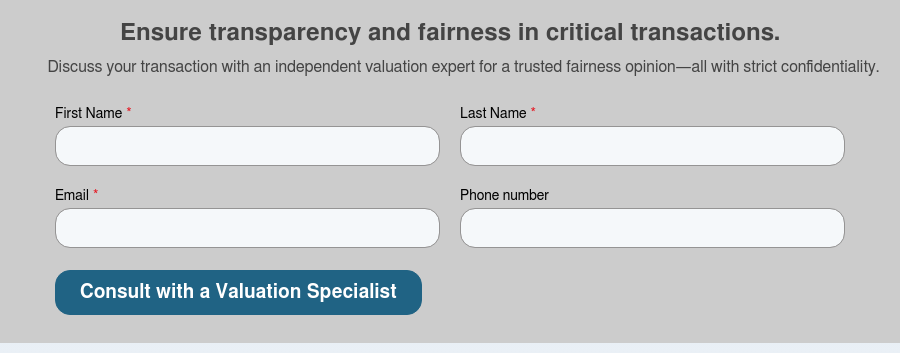Industry Trends
Largest Transactions Closed
- Target
- Buyer
- Value($mm)

Last updated:
Key Takeaways
Fairness opinions function as independent verification that supports boards and advisors in defending transactional decisions and reducing litigation risk arising from inadequate financial diligence.
Fairness opinions have been a foundational element of high-quality M&A advisory, corporate governance, and legal risk mitigation for more than 35 years. Their importance surged after the Smith v. Van Gorkom (1985) decision, where the Delaware Supreme Court held directors personally liable for approving a sale without adequate financial diligence. As Harvard Law School Forum on Corporate Governance points out, fairness opinions have become indispensable tools for investment bankers, corporate attorneys, and boards seeking to validate transaction terms and withstand regulatory or shareholder scrutiny.
As deal complexity grows, particularly involving private equity, secondary transactions, and rollovers, the need for independent financial opinions continues to increase across both public and private markets. Recent SEC rulemaking for private fund advisers, for example, explicitly required fairness or valuation opinions in adviser-led secondary transactions as part of a broader investor-protection framework.
This perspective reflects established valuation methodologies routinely applied in complex, sponsor-driven transactions and corporate governance reviews.
A fairness opinion is an independent financial assessment, typically issued by an investment bank or valuation advisor, stating whether the consideration offered in a proposed transaction is fair from a financial point of view to a defined stakeholder group. For a deeper look at how this fits into broader valuation work in a transaction, including other risk-management tools and compliance considerations, see Achieving the Right Valuation: Key Factors for a Smooth Business Transaction.
For boards of directors, special committees, legal counsel, and M&A advisors, fairness opinions provide:
Fairness opinions do not recommend how shareholders should vote, nor do they address tax, regulatory, or legal matters, they strictly validate financial fairness.
While fairness opinions are standard practice in public company transactions due to SEC disclosure expectations, their relevance in private company deals has expanded sharply. Private company boards share the same fiduciary obligations as public boards but often operate with fewer layers of oversight and more potential for conflicts.
You can learn more about why these opinions are increasingly recommended for privately-held companies in Do You Need a Fairness Opinion for Your Privately Held Company?
Investment bankers and attorneys increasingly recommend fairness opinions for private transactions involving:
In these contexts, a fairness opinion strengthens governance processes and provides defensible, third-party assurance to all stakeholders.
Fairness opinions are routinely obtained in transactions that involve valuation uncertainty, conflict potential, or significant impact on shareholder value. Typical examples include:
Mergers & Acquisitions
Validates pricing, exchange ratios, and financial consideration in transformative M&A deals.
Management Buyouts (MBOs)
Essential when acquirers have inside information or influence over the transaction structure.
Recapitalizations & Restructurings
Supports boards evaluating capital structure changes, debt-for-equity swaps, or balance sheet adjustments.
Employee Stock Ownership Plans (ESOPs)
Often required for ESOP formation, restructuring, or share repurchase transactions. Recent Department of Labor proposals on "adequate consideration" for ESOP stock emphasize fair market value, independence of the valuation adviser, and a documented good-faith determination of value.
Related-Party or Conflict-Driven Transactions
Provides independent analysis when insiders, controlling shareholders, or sponsors are involved.
Bankruptcy or Liquidation Scenarios
Ensures that asset sales, reorganizations, or distributions reflect fair value.
GP-Led Secondary Transactions
Offers objective valuation in continuation fund processes, investor rollovers, or tender options.
Across all these situations, fairness opinions reinforce process integrity and act as a critical safeguard for both directors and advisors.
Fairness opinions are advisable when change-of-control events, insider participation, asymmetric information, or elevated litigation risk create heightened fiduciary or disclosure concerns.
For attorneys, fairness opinions help demonstrate that the board satisfied its duty of care. For investment bankers, they offer an opportunity to provide objective market-based analysis and support overall transaction defensibility.
The Smith v. Van Gorkom ruling reshaped the legal landscape for corporate boards. The Delaware Supreme Court’s decision made clear that directors must rely on independent financial analysis, not solely on management presentations or internal assumptions.
This case established a lasting precedent:
Today, fairness opinions serve as both an evaluation mechanism and a defensive document that strengthens the governance record in any transaction process.
The legal interpretation aligns with widely recognized fiduciary duty standards used in board-level diligence and defense strategies.
Q: What is a fairness opinion?
A: A fairness opinion is an independent financial assessment issued by a valuation advisor or investment bank that states whether the consideration in a proposed transaction is financially fair to a specified stakeholder group. It documents the financial analysis relied upon by boards or committees but does not offer legal or tax advice.
Q: How does a fairness opinion differ from a valuation?
A: A valuation establishes a range of value based on methodologies and inputs, while a fairness opinion delivers a specific conclusion about whether transaction terms are fair from a financial point of view to a defined party. The fairness opinion uses valuation work as an input but frames the conclusion around fairness rather than a single point estimate.
Q: When is a fairness opinion typically required for an ESOP transaction?
A: A fairness opinion is commonly required for ESOP formations, share repurchases, or restructurings to support a documented good-faith determination of fair market value and adequate consideration. Regulatory guidance emphasizes independence of the valuation adviser and clear documentation of the valuation basis.
Q: What triggers should prompt boards or advisors to obtain a fairness opinion?
A: Triggers include change-of-control transactions, insider or sponsor involvement, complex capital structures, minority shareholder interests, cash-out or rollover options, and elevated litigation or regulatory risk. These conditions increase the need for independent verification to support fiduciary duties and disclosure obligations.
Q: Does a fairness opinion replace legal or tax advice?
A: No. A fairness opinion strictly evaluates financial fairness and does not address legal, tax, or regulatory issues, which require consultation with qualified counsel or tax advisors. The opinion complements, but does not substitute for, professional legal or tax guidance.
For investment bankers, a fairness opinion is a critical tool that enhances deal credibility and reduces execution risk.
"For investment bankers, a fairness opinion is a critical tool that enhances deal credibility and reduces execution risk."
— Paul Vogt, Leader of Valuation Practice
For corporate attorneys, it serves as a protective layer that supports fiduciary duty compliance and mitigates litigation exposure.
For boards of directors, it provides an independent, defensible assessment that supports sound judgment and transparent governance.
As M&A activity grows more complex, particularly in private markets and sponsor-driven deals, the role of fairness opinions will continue to expand. In today’s regulatory and legal environment, they are not merely a best practice; they are a strategic necessity.
Recommendations are grounded in repeated application across cross-industry transactions and regulatory review processes.

Paul Vogt
Paul Vogt is a Managing Director at PCE and leads the firm’s valuation practice from its Atlanta office. With over 20 years of experience, he specializes in business valuations for financial reporting, tax planning, litigation support, and corporate strategy across a wide range of industries.